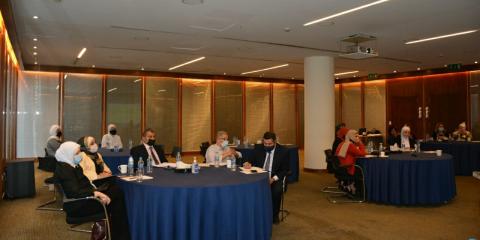

On Sunday, the Higher Population Council held an induction workshop for members and members of the teaching staff of the departments concerned with official universities on the role of the Council in working on population, development and reproductive health issues at the national and regional levels.
The Assistant Secretary-General of the Higher Council for Population, Rania Al-Abadi, indicated that the Council plays an important role as a national focal point for all population issues and information relating to development and contributes to the formulation of policies, strategies and action plans aimed at providing an enabling and supportive environment for population policies and issues in Jordan in order to reach the peak population opportunity and contribute to the well-being of citizens.
She also indicated that The Council's work was based on a diagnosis of the status quo, a response to national and sectoral strategies, the achievement of sustainable development goals 2030, a response to Jordan's commitments in the decisions of regional and global conferences and their follow-up recommendations, and building on lessons learned.
Al-Abadi noted that the Council's vision is that the population dimension should be an essential element of development in order to ensure the optimal investment of population opportunity and the well-being of Jordanian citizens. In its work programmes, the Council also focuses on achieving sustainable and equitable growth based on planning from the perspective of population opportunity policies, responding to the dimensions of forced and voluntary migrations, promoting gender equality and the empowerment of women, strengthening sexual and reproductive health within the human rights system, and integrating the population dimension into national development plans, through action at three levels: (Enabling environment of national policies, strategies and plans, institutional level of systems, capacities and data, individual and community level of awareness, capacity-building and motivation)
The Director of Programmes of the Higher Population Council, Dr. Sawsan Al-Daja, stated that the Council, in collaboration with relevant partners and with the support of the United Nations Population Fund (UNFPA), had adopted the National Population Strategy for the years 2021-2030 in four areas: reproductive and sexual health, socio-economic, women and youth, and migration, asylum and crisis.
She pointed out that the conceptual framework of the strategy was based on the theory of change, which shows how a set of results in the short and medium-term is interrelated in preparation for reaching a long-term goal through four dimensions: "Building phase," which is concerned with the development of population policies related to each of the four hubs, and the adoption and implementation of these policies will contribute to achieving results at three levels, phase II "access phase," which is access to the output of each axis, phase III the "empowerment phase" through which desired results are reached, and the "welfare" phase, which represents the impact.
Al-Daja indicated that a follow-up and evaluation methodology for the national population strategy had been developed, allowing planners and policymakers in the Hashemite Kingdom of Jordan to assess the effectiveness of the methods and methods used to identify and define progress in achieving the Goals, thereby contributing to the development and sustainability of the impact of those policies and programmes and the exchange of experiences between different sectors and institutions.
The Director of the Studies and Policy Unit of the Higher Council also indicated that the Council is the incubator of Share-Ne-Jordan project, which is one of the knowledge platforms of the Global Share-Net Foundation in the Netherlands, which has been in operation since 2016 and lasts for the end of 2024. It aims to support research on sexual and reproductive health and to link it to other variables with the participation of relevant partners in different sectors; to facilitate the building and dissemination of knowledge on sexual and reproductive health and reproductive rights issues both through participation via the Internet and through non-electronic communication; to build the capacity of key partners to identify identified knowledge gaps on sexual and reproductive health and reproductive rights issues in Jordan; and to conduct further qualitative studies and research on the sexual and reproductive health component , and developing the Population Research Base to become more interactive to be directly linked in the future with research centers of academic and research institutions and reproductive health service providers, the Council also provides national focal point with the Global share Net Foundation in the Netherlands to carry out its activities in Jordan through its local partners.







